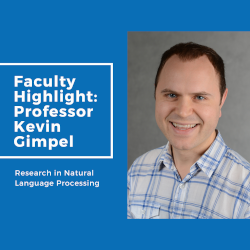
Faculty Research Highlight: Professor Kevin Gimpel
Professor Kevin Gimpel has been a member of TTIC’s faculty since 2012, and primarily conducts research in natural language processing. He is interested in developing technology that helps people in their daily lives, such as programs for collaborative writing, summarization, and machine translation.
At a high level, natural language processing is on a quest to teach computers to read and write like a person does. For example, if a user speaks to a computer it should be able to understand what they are saying. Or, if a message is typed to a computer, it should be able to interpret the text like a person would.
“Fifteen years ago, when I first started doing natural language processing, the key application was machine translation. Now, there are so many new applications coming out because things are getting better and better. And a lot of companies are developing products that involve natural language processing,” said Prof. Gimpel.
His interest in natural language goes back to his time in grammar school. He thought that learning about grammar, sentence structure, and parts of speech was fascinating. After deciding to study computer science as an undergraduate, he discovered NLP was a marriage between these two interests of science and language.
“I got exposed to the field from looking at the course catalog and learning about the faculty’s research. If I hadn’t gone to a university that had so much natural language processing, I may have never really ended up in the field. I was just kind of interested in computer science and programming and doing modeling problems, and stats and probability, but never realized that you could apply computer science to natural language until I was almost about to graduate. I actually took a job, but then wanted to go back to grad school. Since then, over the past ten or fifteen years, the field has really exploded in popularity,” he said.
As a faculty member at TTIC, he particularly enjoys having the freedom to pursue any research direction that interests him. The Institute has the resources to let faculty members work on whatever they are most excited about, even if the payoff may not be in the near future. There is an opportunity to take risks that isn’t always available at other institutions.
Since TTIC isn’t as dependent on outside grants as many other institutions, students and faculty don’t have to chase after funding opportunities. The endowment of the Institute allows for taking a step back, and figuring out what is most important to work on in the long term. The research community at TTIC places a lot of value on making fundamental advances in each area of study.
The community that has been forged at the Institute is one where students and faculty learn from each other, both in the classroom and in outside research. With a very flat hierarchy, there is ample opportunity for mentorship and collaboration.
“Students tend to be more on the pulse of the latest developments in their fields. I often learn things from my students who share papers with me that they discovered at conferences, or from following social media accounts. The ideal scenario is for the faculty to teach the student during the early years about the foundations, and impart how to conduct research, and develop a research vision. But it’s the student who over the course of those years develops an expertise in a particular subfield, and then teaches the advisor about that area as they develop their research that ends up resulting in a PhD dissertation,” he said.
Prof. Gimpel believes that any healthy department should function in that way. Ideally, there is a back and forth where the adviser has things to impart to the student, and the student’s mission is to become an expert in a specific area. Ultimately, both end up learning a lot from each other.
As far as future research, he would like to further explore technology related to collaborative writing. He hopes to develop programs that would help writers and other creative professionals, for example, something that could suggest a metaphor or give a writer other fresh ideas when they get writer’s block.
“I think that’s an opportunity because if the machine gives me a really silly idea, I can easily dismiss it. But maybe, it could give me a really fresh and creative idea that I actually want to use in my writing. This is something that’s not always easy to write a paper about in academia, but if you start playing with something, and it gives you some good ideas, and you think, wow, this could really be helpful for people in their creative pursuits in life,” said Prof. Gimpel.
His advice to current or prospective PhD students is to not put too much pressure on themselves. He always tells students that the goal is to do research, and find something they are really passionate about.
“It takes time to find your interests, that’s why it’s good to dabble and try out different things. But it should be fun, it should be something that you’re really curious about seeing what’s going to happen if you really pursue this line of inquiry. And if you’re not able to find that, then keep searching. Don’t feel pressured to find that thing immediately. Every person is different in terms of how they navigate all of these potential research directions that will be thrown at you during the first couple of years. Once you find something that’s really interesting, then it becomes hard work, but it also becomes fun,” he said.

